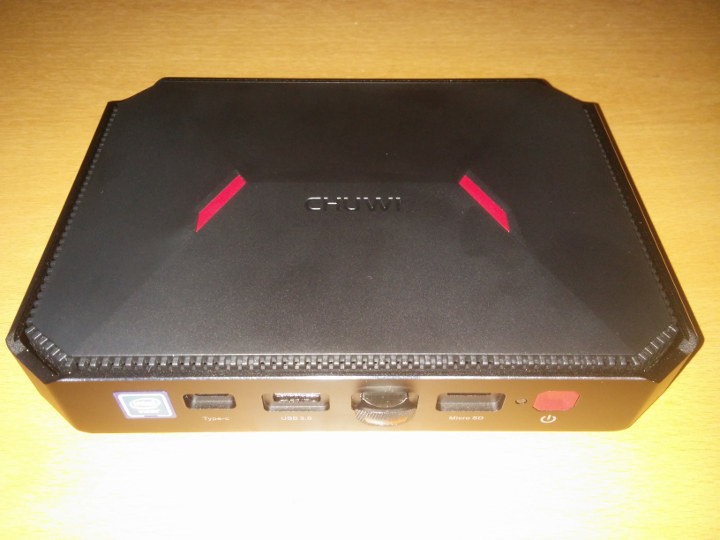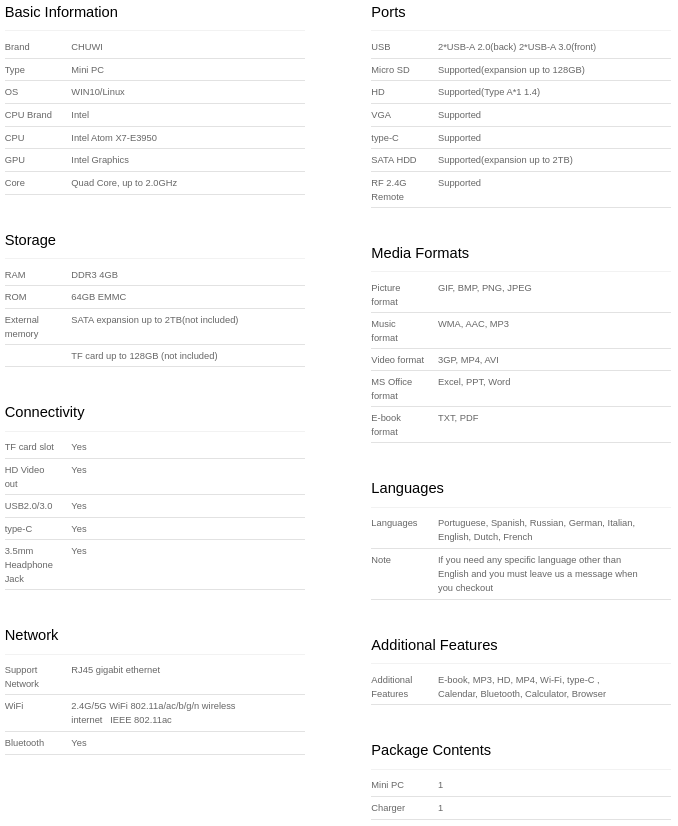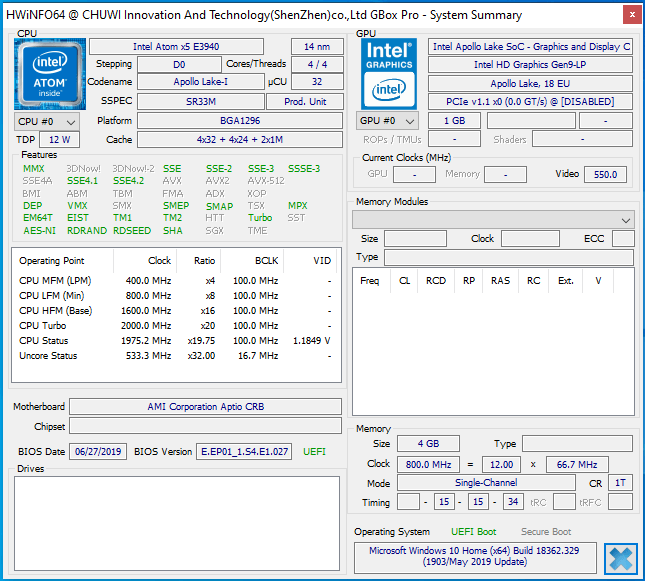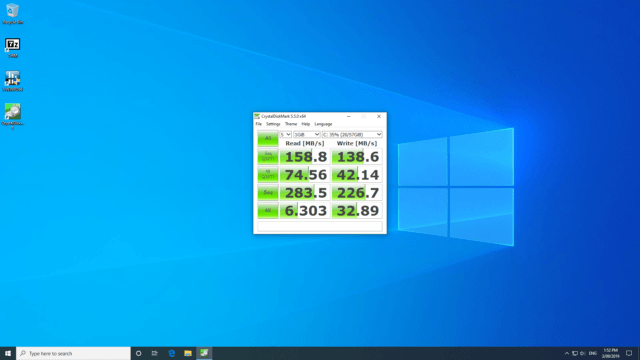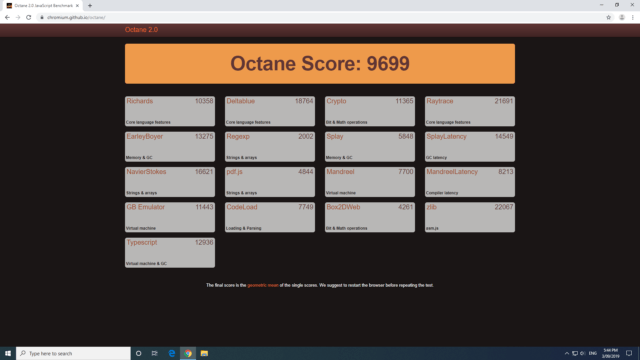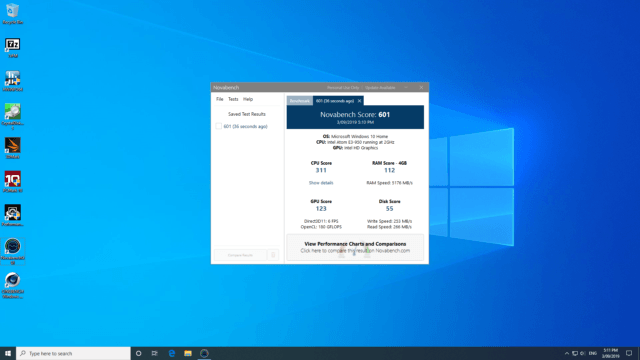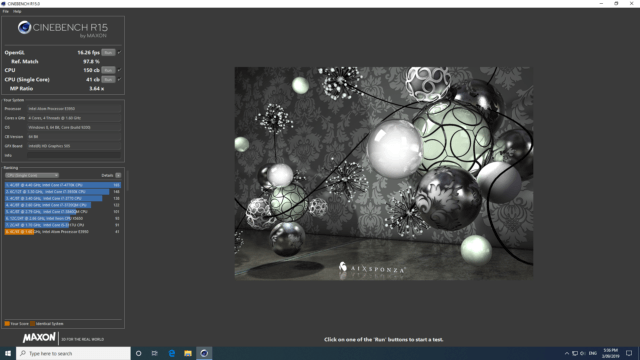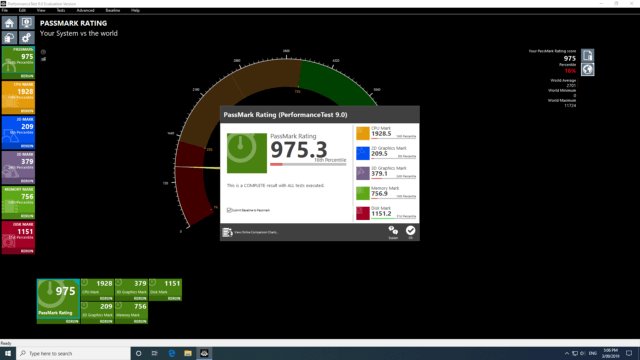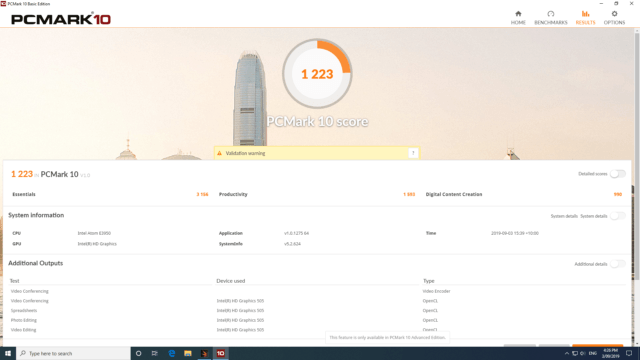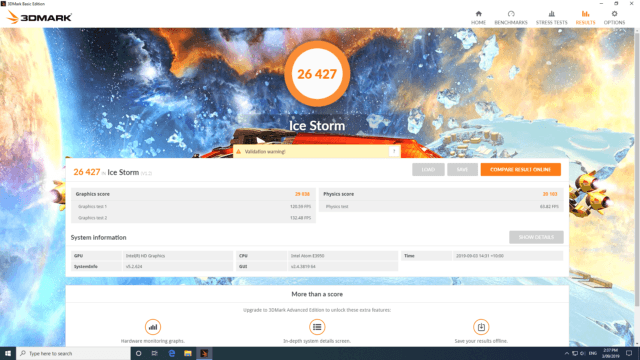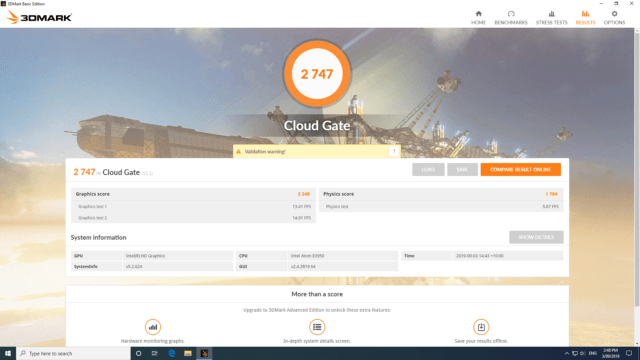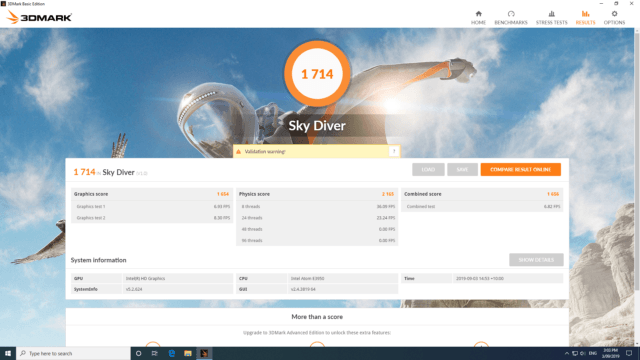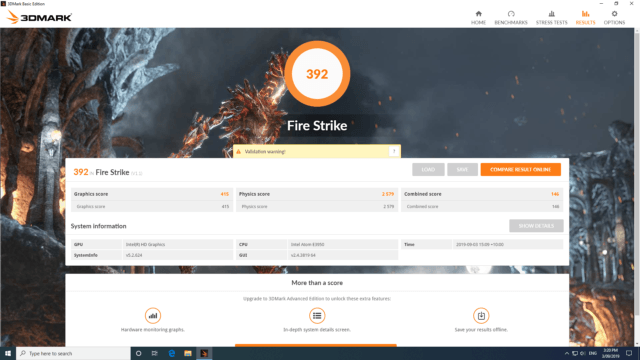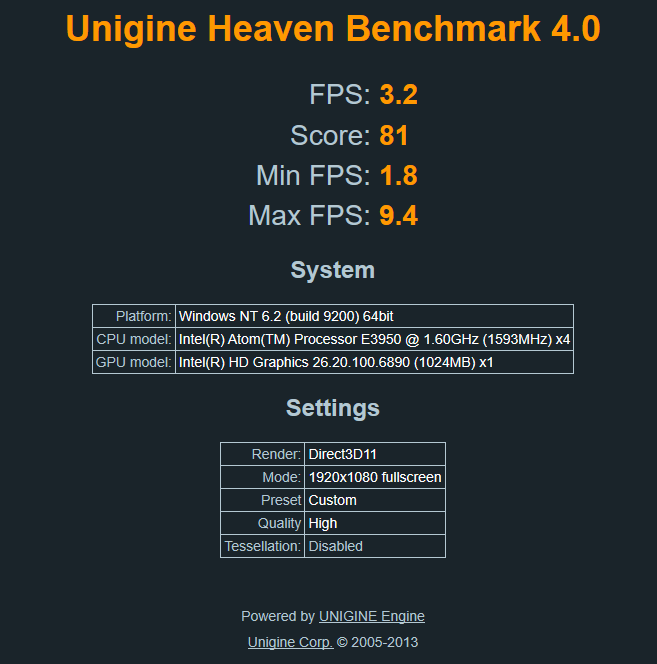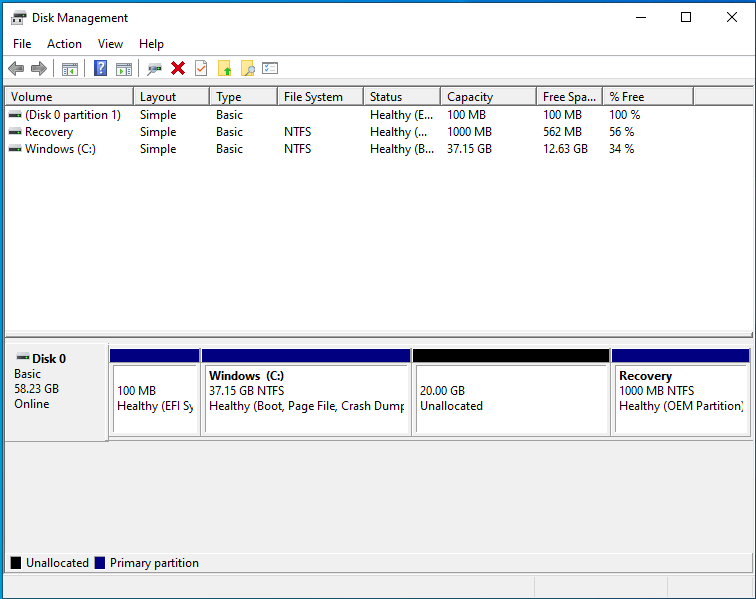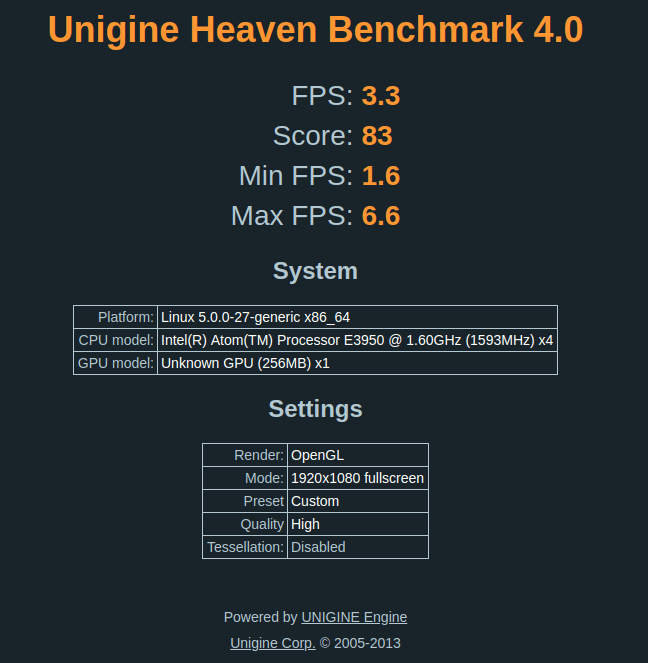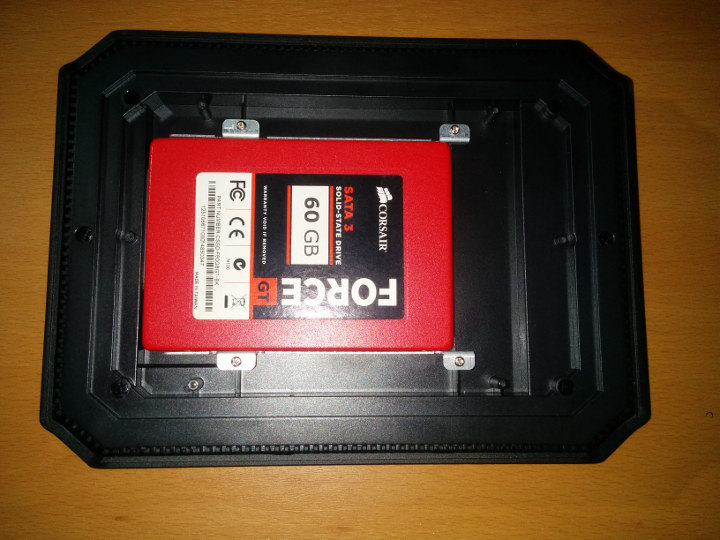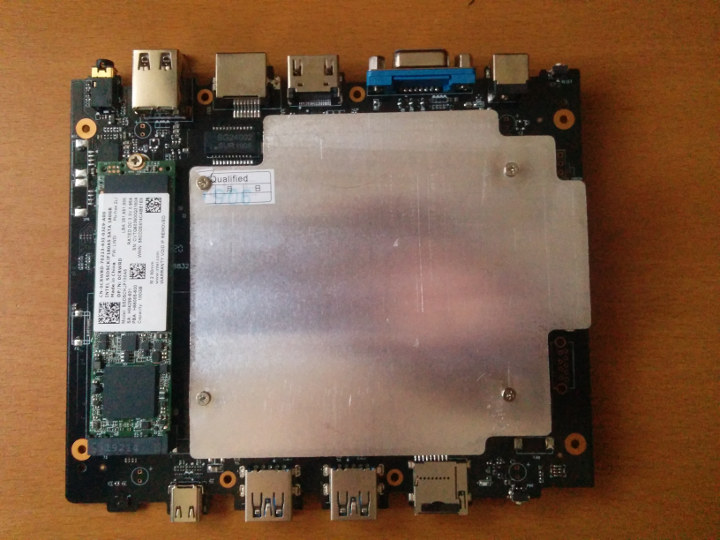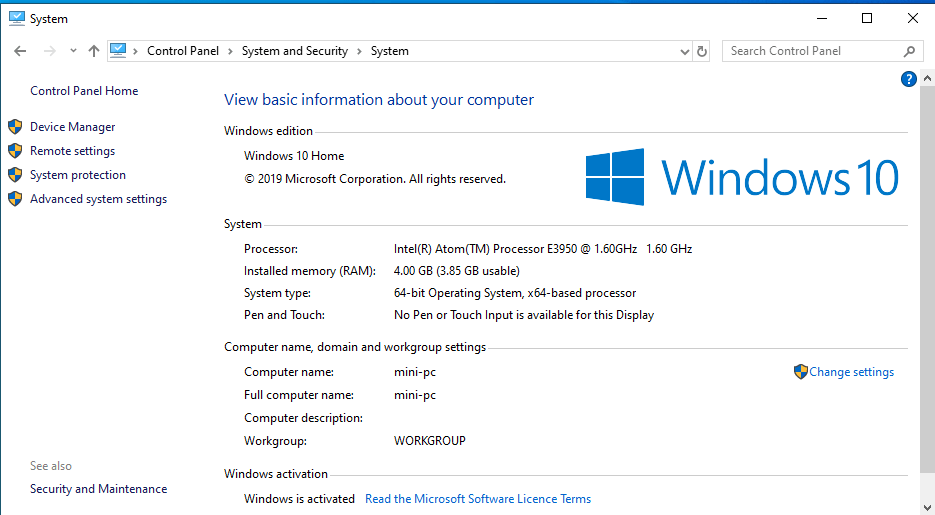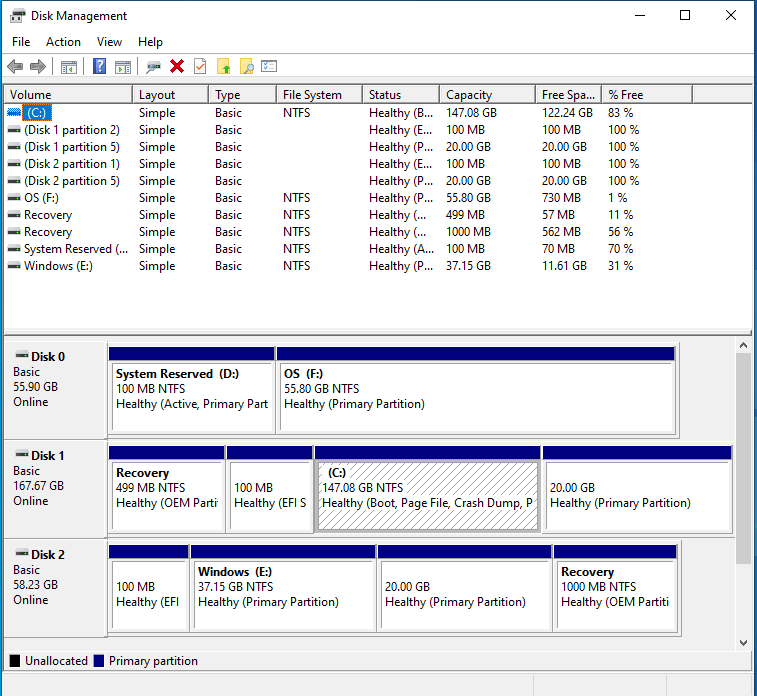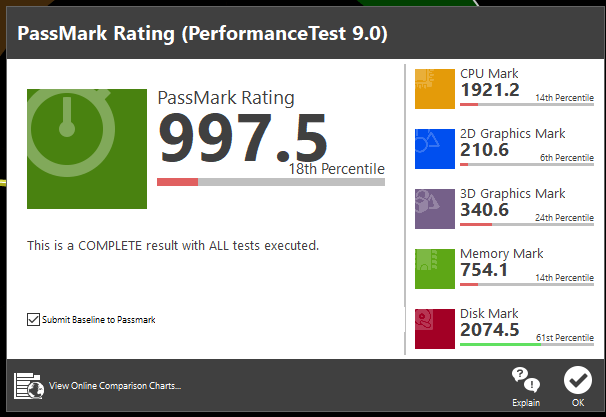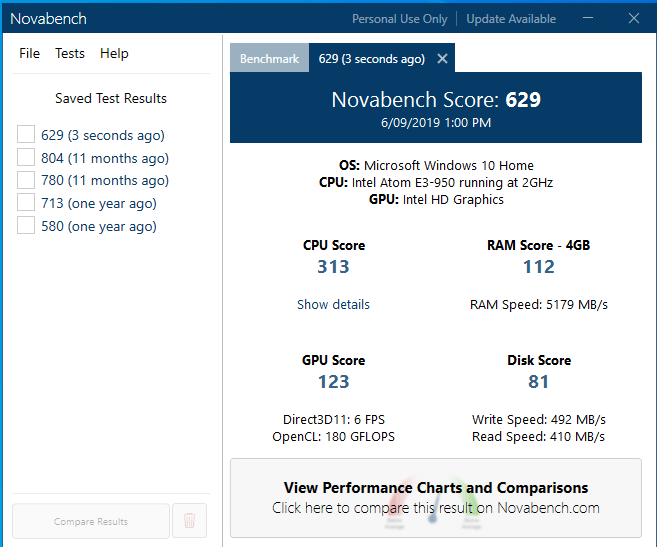CHUWI has released a new mini PC called the GBox Pro. This is a passively cooled mini PC that uses the slightly older Apollo Lake Intel Atom x7-E3950 CPU which is a quad core 4-thread 1.60 GHz processor boosting to 2.00 GHz with Intel’s HD Graphics 505.
The GBox Pro is somewhat physically larger than typical recent mini PCs and consists of a 189 x 139 x 39 mm (7.44 x 5.47 x 1.54 inches) rectangular case with a front panel that includes the power button, micro SD slot, a couple of USB 3.0 ports and a Type-C USB port and then on the rear, a headphone jack, two USB 2.0 ports, a Gigabit ethernet port, an HDMI (2.0) port and a VGA interface. The full specifications include:
The GBox Pro comes with 64GB of eMMC with pre-installed Windows 10 Home (version 1809 OS build 17763.316) together with 4GB of soldered LPDDR4 RAM. The GBox Pro also supports the addition of an optional 2.5” SSD and an undocumented (see below) 2280 M.2 drive:
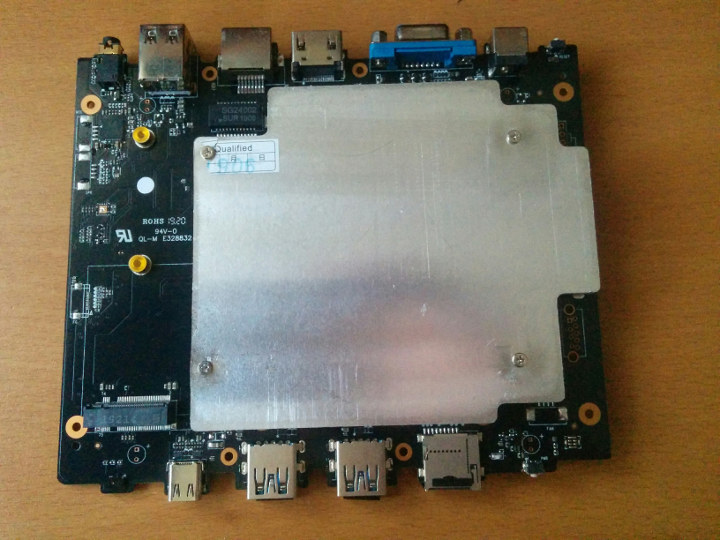
In the box you get a mounting bracket for attaching the device to behind a monitor together with a power brick, a cable and a manual.
Starting with a quick look at the hardware information shows it is aligned to the specification: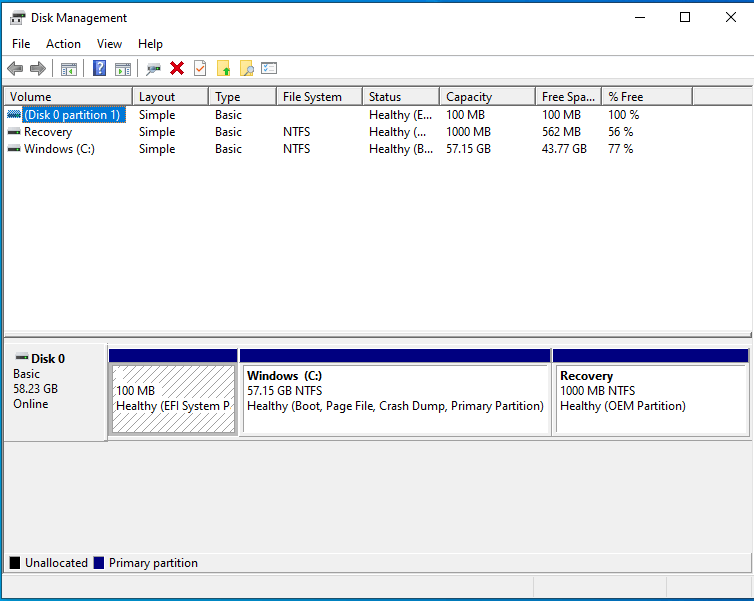
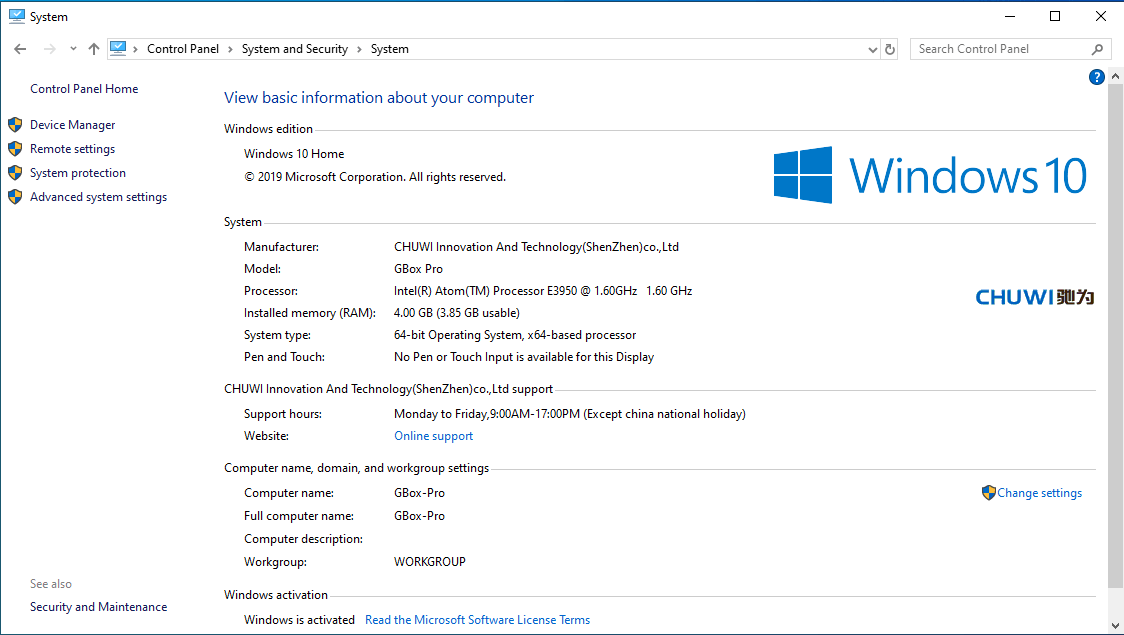
After fully updating Windows to version 1903 OS build 18362.329 (which took a long time) I ran my standard set of benchmarking tools to look at performance under Windows:
and to compare with other Intel mini PCs:
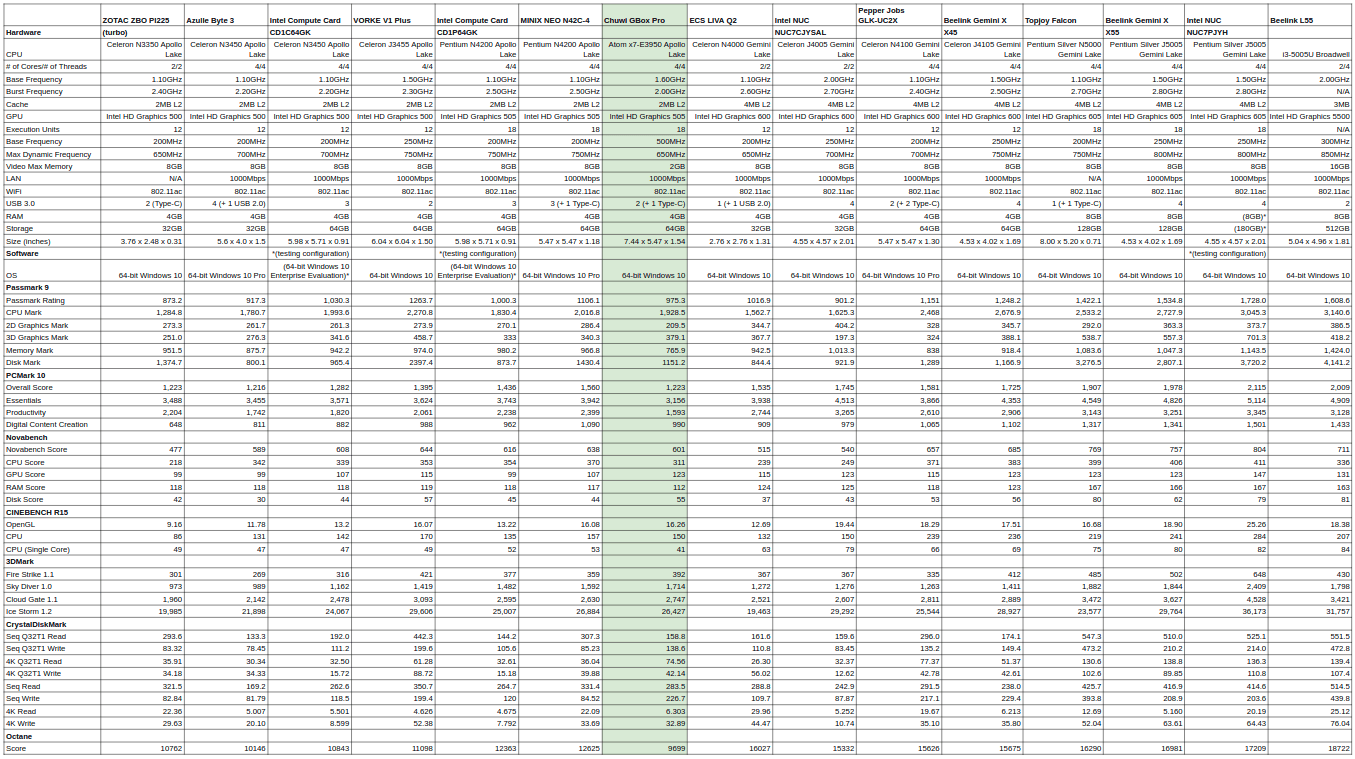
The results need interpreting carefully otherwise they could be misleading because mini PC benchmarks are heavily influenced by the quantity and type of memory and storage installed.
Broadly speaking however the GBox Pro benchmarking performance appears comparable with a low-end Gemini Lake processor with the exception of the JavaScript engine’s performance (Octane 2).
Additionally, I also tested with Geekbench 4 and got a single-core score of 1244, a multi-core score of 3817 and an OpenGL score of 10153:
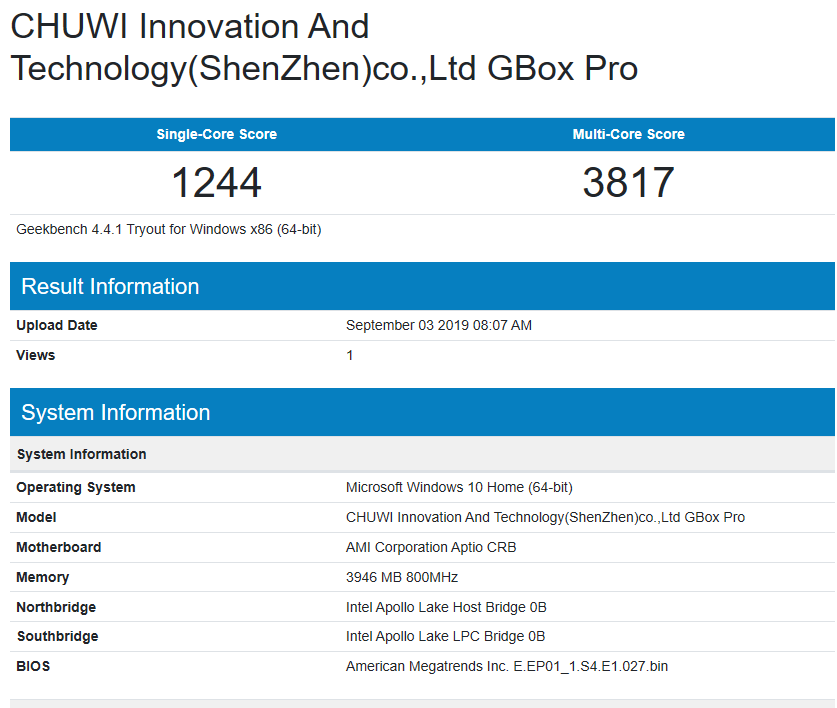
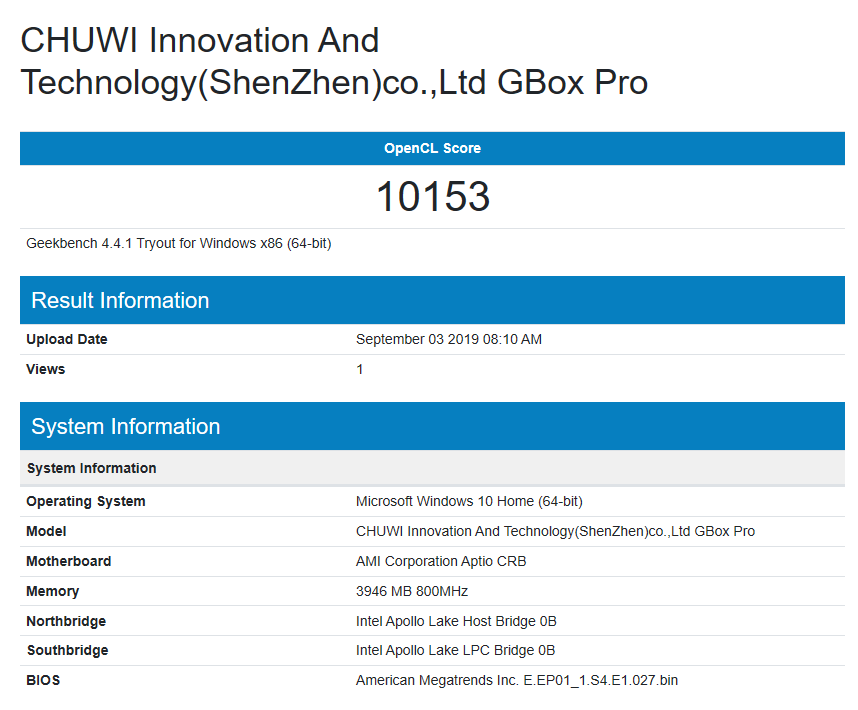
In Windows both 4K@30fps and 4K@60fps videos played fine in Edge and Chrome although there were a few dropped frames in Chrome at the start of the video:
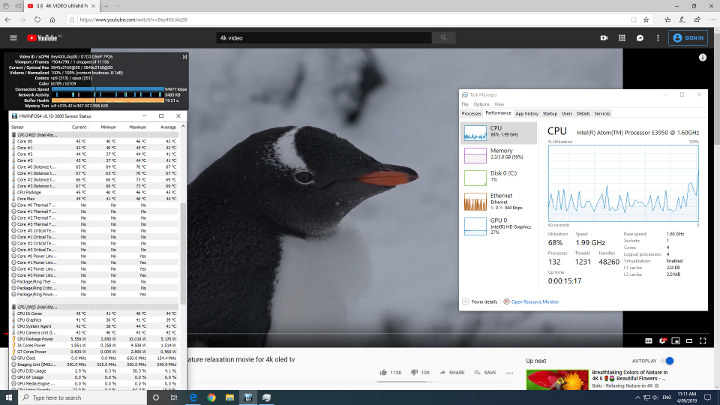
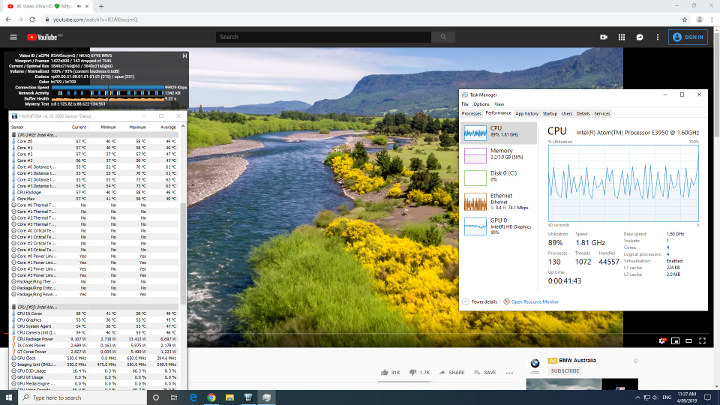
However, it has to be noted that both Edge and Chrome were slow to launch and using YouTube as an application felt laggy.
Videos played using Kodi on Windows with both VP9, H.264 and H.265/HEVC codec encoded videos used hardware for decoding and played fine:
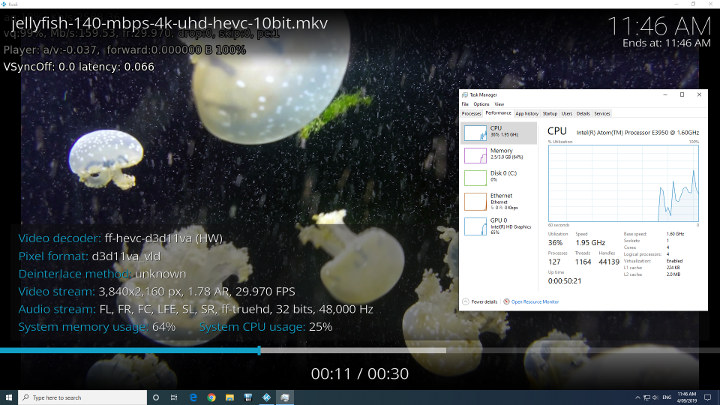
The following table summarises the testing and results:

I also installed and ran the UNIGINE Heaven benchmark with which scored 81 at 3.2 fps:
Therefore the GBox Pro will offer very limited gaming performance.
Next I shrunk the Windows partition and created a new 20GB partition so I could install and dual boot Ubuntu using an Ubuntu 18.04.3 ISO:
After installation a brief check showed everything working including Wifi, Bluetooth and audio. I then ran some basic commands to look at the hardware in more detail:
|
1 2 3 4 5 6 7 8 9 10 11 12 13 14 15 16 17 18 19 20 21 22 23 24 25 26 27 28 29 30 31 32 33 34 35 36 37 38 39 40 41 42 43 44 45 46 47 48 49 50 51 52 53 54 55 56 57 58 59 60 61 62 63 64 65 66 67 68 69 70 71 72 73 74 75 76 77 78 79 80 81 82 83 84 85 86 87 88 89 90 91 92 93 94 95 96 97 98 99 100 101 102 103 104 105 106 107 108 109 110 111 112 113 114 115 116 117 118 119 120 121 122 123 124 125 126 127 128 129 130 131 132 133 134 135 136 137 138 139 140 141 142 143 144 145 146 147 148 149 150 151 152 153 154 155 156 157 158 159 160 161 162 163 164 165 166 167 168 169 170 171 172 173 174 175 176 177 178 179 180 181 182 183 184 185 186 187 188 189 190 191 192 193 194 195 196 197 198 199 200 201 202 203 204 205 206 207 208 209 210 211 212 213 214 215 216 217 218 219 220 221 222 223 224 225 226 227 228 |
linuxium@GBox-Pro:~$ lsb_release -a Distributor ID: Ubuntu Description: Ubuntu 18.04.3 LTS Release: 18.04 Codename: bionic linuxium@GBox-Pro:~$ linuxium@GBox-Pro:~$ uname -a Linux GBox-Pro 5.0.0-27-generic #28~18.04.1-Ubuntu SMP Thu Aug 22 03:00:32 UTC 2019 x86_64 x86_64 x86_64 GNU/Linux linuxium@GBox-Pro:~$ linuxium@GBox-Pro:~$ inxi -Fc0 System: Host: GBox-Pro Kernel: 5.0.0-27-generic x86_64 bits: 64 Console: tty 0 Distro: Ubuntu 18.04.3 LTS Machine: Device: desktop System: CHUWI Innovation And (ShenZhen) product: GBox Pro serial: GBoxProQ4G19071923 Mobo: AMI model: Aptio CRB v: $(BIOS_VER_MINOR_STR) serial: GBoxProQ4G19071923 UEFI: American Megatrends v: E.EP01_1.S4.E1.027.bin date: 06/27/2019 Battery hidpp__0: charge: N/A condition: NA/NA Wh hidpp__1: charge: N/A condition: NA/NA Wh CPU: Quad core Intel Atom E3950 (-MCP-) cache: 1024 KB clock speeds: max: 2000 MHz 1: 896 MHz 2: 893 MHz 3: 921 MHz 4: 967 MHz Graphics: Card: Intel Celeron N3350/Pentium N4200/Atom E3900 Series Integrated Graphics Controller Display Server: X.Org 1.20.4 driver: i915 Resolution: 1920x1080@60.00hz OpenGL: renderer: Mesa DRI Intel HD Graphics 505 (Broxton) version: 4.5 Mesa 19.0.8 Audio: Card Intel Celeron N3350/Pentium N4200/Atom E3900 Series Audio Cluster driver: snd_hda_intel Sound: Advanced Linux Sound Architecture v: k5.0.0-27-generic Network: Card-1: Intel Wireless 3165 driver: iwlwifi IF: wlp1s0 state: down mac: e4:42:a6:f9:ca:c2 Card-2: Realtek RTL8111/8168/8411 PCI Express Gigabit Ethernet Controller driver: r8169 IF: enp2s0 state: up speed: 1000 Mbps duplex: full mac: 00:e0:4c:69:73:67 Drives: HDD Total Size: NA (-) ID-1: /dev/mmcblk1 model: N/A size: 62.5GB Partition: ID-1: / size: 20G used: 7.1G (38%) fs: ext4 dev: /dev/mmcblk1p5 RAID: No RAID devices: /proc/mdstat, md_mod kernel module present Sensors: System Temperatures: cpu: 43.0C mobo: N/A Fan Speeds (in rpm): cpu: N/A Info: Processes: 262 Uptime: 1 min Memory: 738.5/3791.3MB Client: Shell (review-tests.sh) inxi: 2.3.56 linuxium@GBox-Pro:~$ linuxium@GBox-Pro:~$ df -h Filesystem Size Used Avail Use% Mounted on udev 1.9G 0 1.9G 0% /dev tmpfs 380M 1.9M 378M 1% /run /dev/mmcblk1p5 20G 7.1G 12G 38% / tmpfs 1.9G 0 1.9G 0% /dev/shm tmpfs 5.0M 4.0K 5.0M 1% /run/lock tmpfs 1.9G 0 1.9G 0% /sys/fs/cgroup /dev/loop0 4.2M 4.2M 0 100% /snap/gnome-calculator/406 /dev/loop2 89M 89M 0 100% /snap/core/7270 /dev/loop3 150M 150M 0 100% /snap/gnome-3-28-1804/67 /dev/loop4 3.8M 3.8M 0 100% /snap/gnome-system-monitor/100 /dev/loop1 55M 55M 0 100% /snap/core18/1066 /dev/loop5 1.0M 1.0M 0 100% /snap/gnome-logs/61 /dev/loop6 15M 15M 0 100% /snap/gnome-characters/296 /dev/loop7 43M 43M 0 100% /snap/gtk-common-themes/1313 /dev/mmcblk1p1 96M 50M 47M 52% /boot/efi tmpfs 380M 16K 380M 1% /run/user/121 tmpfs 380M 28K 380M 1% /run/user/1000 /dev/mmcblk1p3 38G 27G 11G 73% /media/linuxium/Windows tmpfs 380M 0 380M 0% /run/user/0 linuxium@GBox-Pro:~$ linuxium@GBox-Pro:~$ lsblk -a NAME MAJ:MIN RM SIZE RO TYPE MOUNTPOINT loop0 7:0 0 4M 1 loop /snap/gnome-calculator/406 loop1 7:1 0 54.4M 1 loop /snap/core18/1066 loop2 7:2 0 88.5M 1 loop /snap/core/7270 loop3 7:3 0 149.9M 1 loop /snap/gnome-3-28-1804/67 loop4 7:4 0 3.7M 1 loop /snap/gnome-system-monitor/100 loop5 7:5 0 1008K 1 loop /snap/gnome-logs/61 loop6 7:6 0 14.8M 1 loop /snap/gnome-characters/296 loop7 7:7 0 42.8M 1 loop /snap/gtk-common-themes/1313 loop8 7:8 0 0 loop mmcblk1 179:0 0 58.2G 0 disk ├─mmcblk1p1 179:1 0 100M 0 part /boot/efi ├─mmcblk1p2 179:2 0 16M 0 part ├─mmcblk1p3 179:3 0 37.2G 0 part /media/linuxium/Windows ├─mmcblk1p4 179:4 0 1000M 0 part └─mmcblk1p5 179:5 0 20G 0 part / mmcblk1boot0 179:8 0 4M 1 disk mmcblk1boot1 179:16 0 4M 1 disk linuxium@GBox-Pro:~$ linuxium@GBox-Pro:~$ sudo lshw -C cpu *-cpu description: CPU product: Intel(R) Atom(TM) Processor E3950 @ 1.60GHz vendor: Intel Corp. physical id: 34 bus info: cpu@0 version: Intel(R) Atom(TM) Processor E3950 @ 1.60GHz slot: SOCKET 0 size: 1925MHz capacity: 2400MHz width: 64 bits clock: 100MHz capabilities: x86-64 fpu fpu_exception wp vme de pse tsc msr pae mce cx8 apic sep mtrr pge mca cmov pat pse36 clflush dts acpi mmx fxsr sse sse2 ss ht tm pbe syscall nx pdpe1gb rdtscp constant_tsc art arch_perfmon pebs bts rep_good nopl xtopology tsc_reliable nonstop_tsc cpuid aperfmperf tsc_known_freq pni pclmulqdq dtes64 monitor ds_cpl vmx est tm2 ssse3 sdbg cx16 xtpr pdcm sse4_1 sse4_2 x2apic movbe popcnt tsc_deadline_timer aes xsave rdrand lahf_lm 3dnowprefetch cpuid_fault cat_l2 ibrs ibpb stibp tpr_shadow vnmi flexpriority ept vpid ept_ad fsgsbase tsc_adjust smep erms mpx rdt_a rdseed smap clflushopt intel_pt sha_ni xsaveopt xsavec xgetbv1 xsaves dtherm ida arat pln pts md_clear arch_capabilities cpufreq configuration: cores=4 enabledcores=4 threads=4 linuxium@GBox-Pro:~$ linuxium@GBox-Pro:~$ sudo lshw -C memory *-firmware description: BIOS vendor: American Megatrends Inc. physical id: 0 version: E.EP01_1.S4.E1.027.bin date: 06/27/2019 size: 64KiB capacity: 5056KiB capabilities: pci upgrade shadowing cdboot bootselect socketedrom edd int13floppy1200 int13floppy720 int13floppy2880 int5printscreen int14serial int17printer acpi usb biosbootspecification uefi *-memory description: System Memory physical id: 2e slot: System board or motherboard size: 4GiB *-bank:0 description: DIMM LPDDR4 Synchronous 1600 MHz (0.6 ns) product: 123456789012345678 vendor: ABCD physical id: 0 serial: 1234 slot: ChannelA-DIMM0 size: 2GiB width: 16 bits clock: 1600MHz (0.6ns) *-bank:1 description: DIMM LPDDR4 Synchronous 1600 MHz (0.6 ns) product: 123456789012345678 vendor: ABCD physical id: 1 serial: 1234 slot: ChannelB-DIMM0 size: 2GiB width: 16 bits clock: 1600MHz (0.6ns) *-cache:0 description: L1 cache physical id: 32 slot: CPU Internal L1 size: 224KiB capacity: 224KiB capabilities: synchronous internal write-back configuration: level=1 *-cache:1 description: L2 cache physical id: 33 slot: CPU Internal L2 size: 2MiB capacity: 2MiB capabilities: synchronous internal write-back unified configuration: level=2 linuxium@GBox-Pro:~$ linuxium@GBox-Pro:~$ free -mh total used free shared buff/cache available Mem: 3.7G 688M 2.3G 257M 734M 2.6G Swap: 947M 0B 947M linuxium@GBox-Pro:~$ linuxium@GBox-Pro:~$ sudo lshw -C network *-network description: Wireless interface product: Wireless 3165 vendor: Intel Corporation physical id: 0 bus info: pci@0000:01:00.0 logical name: wlp1s0 version: 91 serial: e4:42:a6:f9:ca:c2 width: 64 bits clock: 33MHz capabilities: pm msi pciexpress bus_master cap_list ethernet physical wireless configuration: broadcast=yes driver=iwlwifi driverversion=5.0.0-27-generic firmware=29.1044073957.0 latency=0 link=no multicast=yes wireless=IEEE 802.11 resources: irq:127 memory:92200000-92201fff *-network description: Ethernet interface product: RTL8111/8168/8411 PCI Express Gigabit Ethernet Controller vendor: Realtek Semiconductor Co., Ltd. physical id: 0 bus info: pci@0000:02:00.0 logical name: enp2s0 version: 15 serial: 00:e0:4c:69:73:67 size: 1Gbit/s capacity: 1Gbit/s width: 64 bits clock: 33MHz capabilities: pm msi pciexpress msix bus_master cap_list ethernet physical tp mii 10bt 10bt-fd 100bt 100bt-fd 1000bt-fd autonegotiation configuration: autonegotiation=on broadcast=yes driver=r8169 duplex=full firmware=rtl8168h-2_0.0.2 02/26/15 ip=xxx.xxx.xxx.xxx latency=0 link=yes multicast=yes port=MII speed=1Gbit/s resources: irq:20 ioport:e000(size=256) memory:92104000-92104fff memory:92100000-92103fff linuxium@GBox-Pro:~$ linuxium@GBox-Pro:~$ dmesg | grep "MMC card" [ 2.387893] mmc1: new HS400 MMC card at address 0001 linuxium@GBox-Pro:~$ linuxium@GBox-Pro:~$ lsusb Bus 002 Device 001: ID 1d6b:0003 Linux Foundation 3.0 root hub Bus 001 Device 005: ID 8087:0a2a Intel Corp. Bus 001 Device 003: ID 0bda:0129 Realtek Semiconductor Corp. RTS5129 Card Reader Controller Bus 001 Device 006: ID 046d:c52b Logitech, Inc. Unifying Receiver Bus 001 Device 004: ID 10d5:55a4 Uni Class Technology Co., Ltd Bus 001 Device 002: ID 1a40:0101 Terminus Technology Inc. Hub Bus 001 Device 001: ID 1d6b:0002 Linux Foundation 2.0 root hub linuxium@GBox-Pro:~$ linuxium@GBox-Pro:~$ lspci 00:00.0 Host bridge: Intel Corporation Celeron N3350/Pentium N4200/Atom E3900 Series Host Bridge (rev 0b) 00:00.1 Signal processing controller: Intel Corporation Device 5a8c (rev 0b) 00:02.0 VGA compatible controller: Intel Corporation Celeron N3350/Pentium N4200/Atom E3900 Series Integrated Graphics Controller (rev 0b) 00:03.0 Multimedia controller: Intel Corporation Celeron N3350/Pentium N4200/Atom E3900 Series Imaging Unit (rev 0b) 00:0e.0 Audio device: Intel Corporation Celeron N3350/Pentium N4200/Atom E3900 Series Audio Cluster (rev 0b) 00:0f.0 Communication controller: Intel Corporation Celeron N3350/Pentium N4200/Atom E3900 Series Trusted Execution Engine (rev 0b) 00:12.0 SATA controller: Intel Corporation Celeron N3350/Pentium N4200/Atom E3900 Series SATA AHCI Controller (rev 0b) 00:13.0 PCI bridge: Intel Corporation Celeron N3350/Pentium N4200/Atom E3900 Series PCI Express Port A #1 (rev fb) 00:13.2 PCI bridge: Intel Corporation Celeron N3350/Pentium N4200/Atom E3900 Series PCI Express Port A #3 (rev fb) 00:15.0 USB controller: Intel Corporation Celeron N3350/Pentium N4200/Atom E3900 Series USB xHCI (rev 0b) 00:16.0 Signal processing controller: Intel Corporation Celeron N3350/Pentium N4200/Atom E3900 Series I2C Controller #1 (rev 0b) 00:16.1 Signal processing controller: Intel Corporation Celeron N3350/Pentium N4200/Atom E3900 Series I2C Controller #2 (rev 0b) 00:16.2 Signal processing controller: Intel Corporation Celeron N3350/Pentium N4200/Atom E3900 Series I2C Controller #3 (rev 0b) 00:16.3 Signal processing controller: Intel Corporation Celeron N3350/Pentium N4200/Atom E3900 Series I2C Controller #4 (rev 0b) 00:17.0 Signal processing controller: Intel Corporation Celeron N3350/Pentium N4200/Atom E3900 Series I2C Controller #5 (rev 0b) 00:17.1 Signal processing controller: Intel Corporation Celeron N3350/Pentium N4200/Atom E3900 Series I2C Controller #6 (rev 0b) 00:17.2 Signal processing controller: Intel Corporation Celeron N3350/Pentium N4200/Atom E3900 Series I2C Controller #7 (rev 0b) 00:17.3 Signal processing controller: Intel Corporation Celeron N3350/Pentium N4200/Atom E3900 Series I2C Controller #8 (rev 0b) 00:18.0 Signal processing controller: Intel Corporation Celeron N3350/Pentium N4200/Atom E3900 Series HSUART Controller #1 (rev 0b) 00:18.1 Signal processing controller: Intel Corporation Celeron N3350/Pentium N4200/Atom E3900 Series HSUART Controller #2 (rev 0b) 00:18.2 Signal processing controller: Intel Corporation Celeron N3350/Pentium N4200/Atom E3900 Series HSUART Controller #3 (rev 0b) 00:18.3 Signal processing controller: Intel Corporation Celeron N3350/Pentium N4200/Atom E3900 Series HSUART Controller #4 (rev 0b) 00:19.0 Signal processing controller: Intel Corporation Celeron N3350/Pentium N4200/Atom E3900 Series SPI Controller #1 (rev 0b) 00:19.1 Signal processing controller: Intel Corporation Celeron N3350/Pentium N4200/Atom E3900 Series SPI Controller #2 (rev 0b) 00:19.2 Signal processing controller: Intel Corporation Celeron N3350/Pentium N4200/Atom E3900 Series SPI Controller #3 (rev 0b) 00:1b.0 SD Host controller: Intel Corporation Celeron N3350/Pentium N4200/Atom E3900 Series SDXC/MMC Host Controller (rev 0b) 00:1c.0 SD Host controller: Intel Corporation Celeron N3350/Pentium N4200/Atom E3900 Series eMMC Controller (rev 0b) 00:1e.0 SD Host controller: Intel Corporation Celeron N3350/Pentium N4200/Atom E3900 Series SDIO Controller (rev 0b) 00:1f.0 ISA bridge: Intel Corporation Celeron N3350/Pentium N4200/Atom E3900 Series Low Pin Count Interface (rev 0b) 00:1f.1 SMBus: Intel Corporation Celeron N3350/Pentium N4200/Atom E3900 Series SMBus Controller (rev 0b) 01:00.0 Network controller: Intel Corporation Wireless 3165 (rev 91) 02:00.0 Ethernet controller: Realtek Semiconductor Co., Ltd. RTL8111/8168/8411 PCI Express Gigabit Ethernet Controller (rev 15) linuxium@GBox-Pro:~$ |
Playing videos in Ubuntu was slightly worse than on other Intel processor-based mini PCs. Firefox 4K@30fps was unwatchable
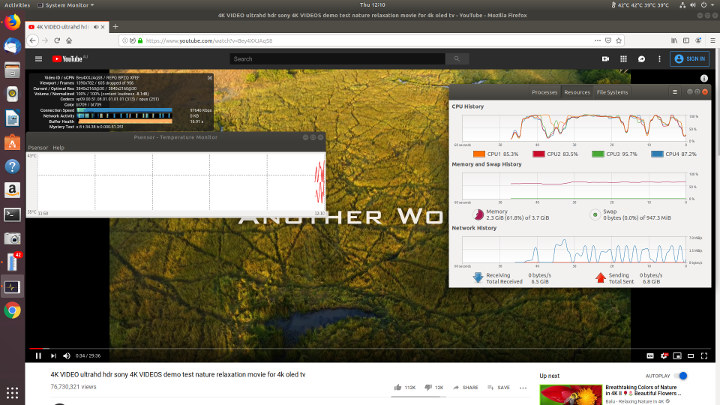
but was fine when played at 1440p.
Firefox 4K @ 60fps and 1440p @ 60fps videos just would not play. At 1080p @ 60fps 493 frames were dropped right at the start of the video and then it played but with occasional stuttering. Only at 720p @ 60fps did the video play smoothly:
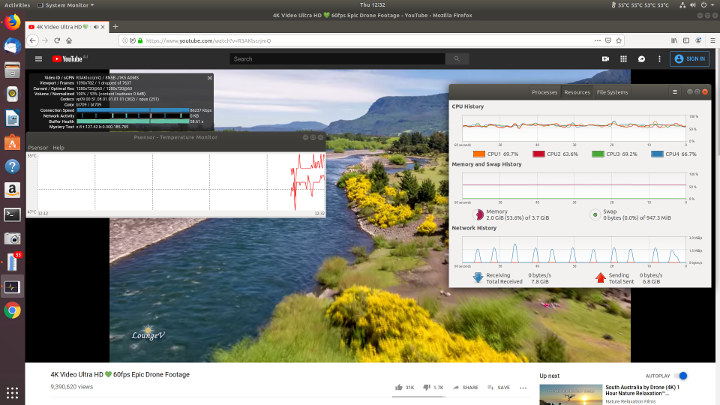
Chrome in Ubuntu was similar to Firefox. 4K @ 30fps was unwatchable but fine when played at 1440p although there was the occasional micro-stutter due to dropped frames:
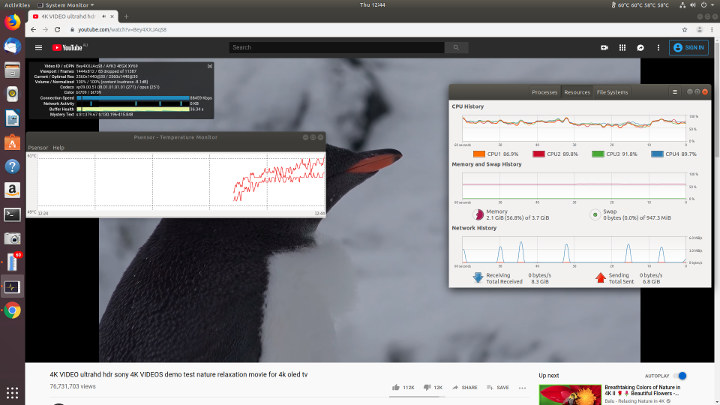
Again 4K @ 60fps and 1440p @ 60fps were unwatchable but so too was 1080p @ 60fps and even at 720p @ 60fps the video was juddery with dropped frames:
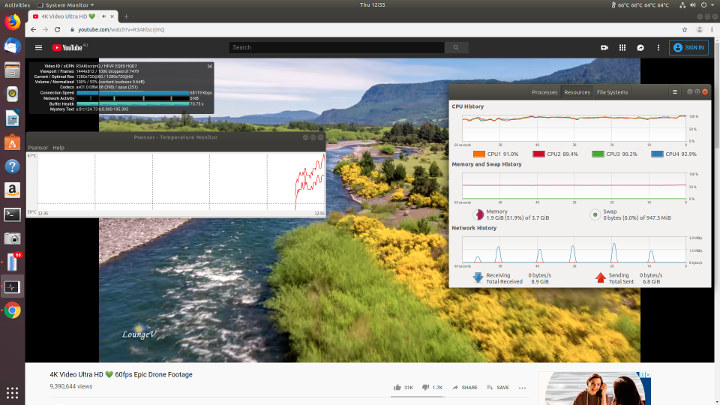
Videos played using Kodi on Ubuntu played fine as VP9, H.264 and H.265/HEVC codec encoded videos used hardware for decoding:
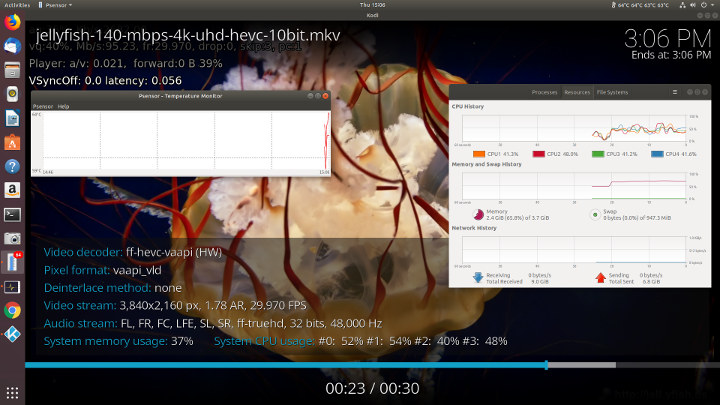
The following table summarises the testing and results:
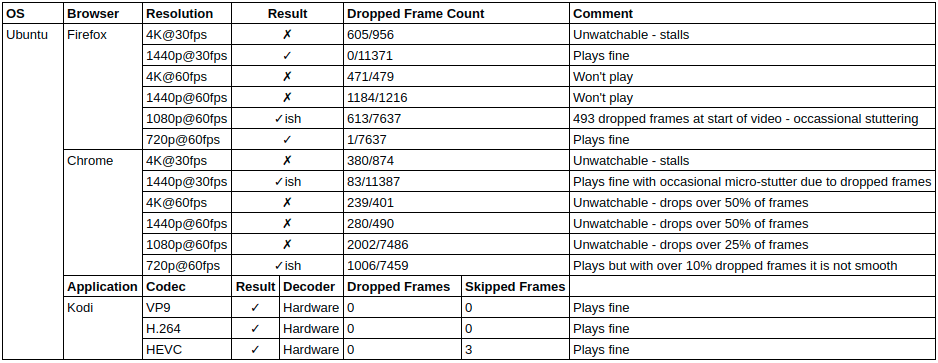
Interestingly when I ran Octane the result was slightly higher compared to that of Windows at 10,010 vs. 9,699:
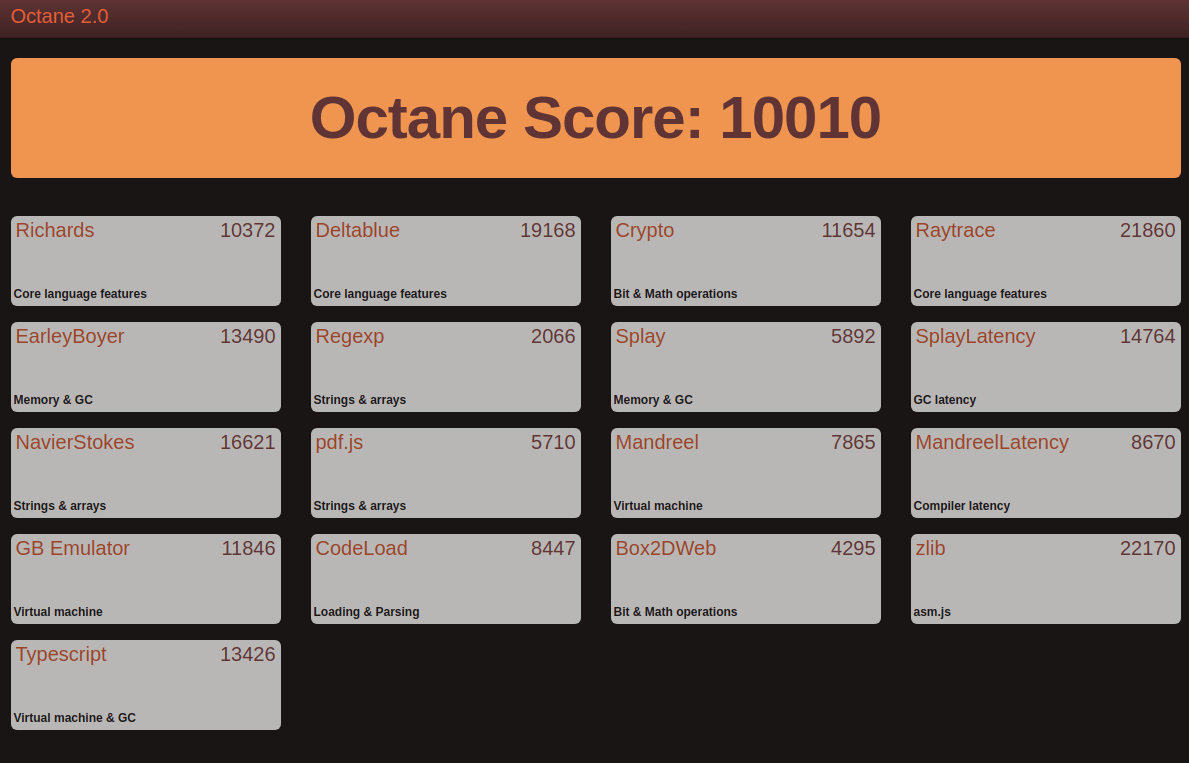
So I installed and ran the UNIGINE Heaven benchmark under Ubuntu which scored 83 at 3.3fps:
which indicates that the GBox Pro will offer very limited gaming performance under Linux.
The GBox Pro is a fanless device relying solely on passive heat dissipation.
Cooling seemed to be effective as under Ubuntu I ran a VP9 video in Kodi for 30 minutes and the internal temperature whilst it climbed throughout the playback remained manageable and seemed to peak at the end of the video at around 75°C:
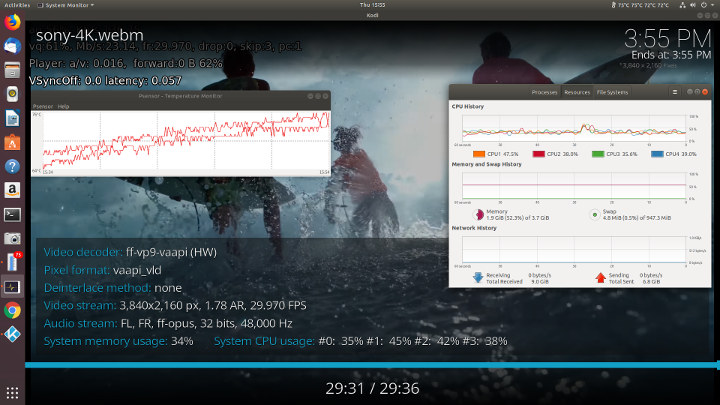
At this time the external temperature of the device reached a maximum of 37.3°C with an average of around 35°C to 37°C across the top of the device, noting that the ambient temperature was 17°C.
I also ran a stress test to see the effect on the cooling capabilities:
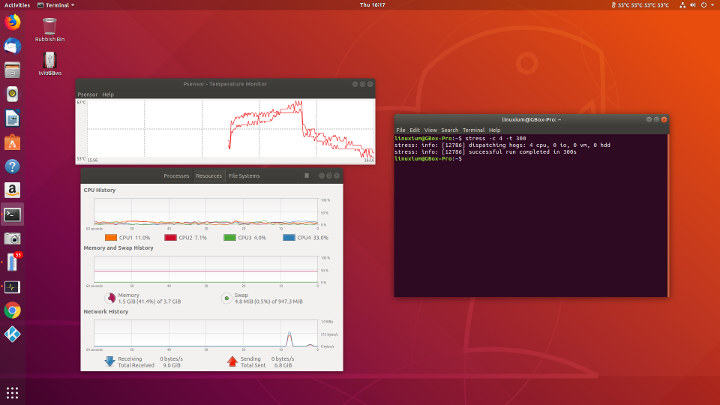
The CPU temperature before the test commenced was 56°C and during the test quickly climbed to 66°C. Five minutes after the test had completed the temperature had dropped to 54°C.
Given the optional storage expandability of the GBox Pro I also installed an internal SSD by following the included guide which documents its installation. It involved removing six screws and the baseplate to reveal an SSD mount:
I then went further by removing an additional six screws to take the base off completely followed by the four screws that secured the motherboard to the top of the case. Then after removing the two Wifi connectors, I could completely remove the motherboard and access an undocumented 2280 M.2 slot on the underside into which I installed an Intel SSDSCKJF180A5 SATA 180GB 2280 M.2:
This M.2 drive had both Windows and Ubuntu previously installed on it. I first booted Windows from the M.2 drive and installed some missing drivers which I took from a Double Driver backup from the Windows installed on the eMMC. I then confirmed that Windows was indeed activated:
and that the newly installed SSD was also visible:
I then re-ran some benchmarks including CrystalDiskMark, PassMark and Novabench: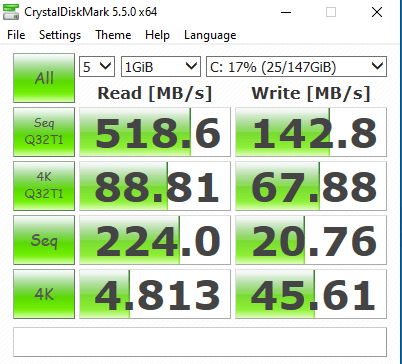
Obviously having a faster drive has slightly improved the overall benchmark results.
I then booted Ubuntu from the M.2 drive:
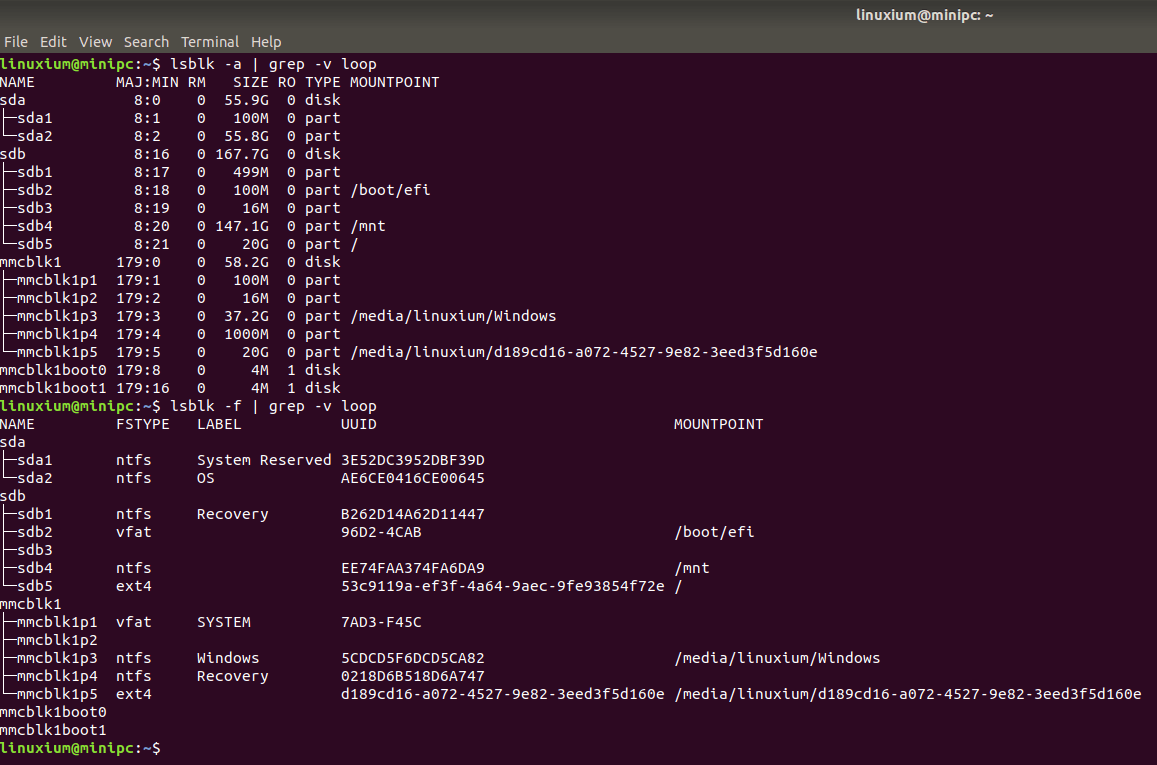
and again confirmed that the SSD was visible.
Having updated to the latest Ubuntu 18.04.3 software running the Ubuntu 4.15.0-60 kernel I then ran some Linux benchmarks which I’ve previously explained in details in “Intel Mini PCs Linux Performance Comparison” post.
I first ran my standard Phoronix Test Suite benchmarks and compared with my previous results from other mini PCs:


As the full results might be a little confusing because for some tests, higher is better, whereas for others, lower is better, the following bar chart may be easier to understand:
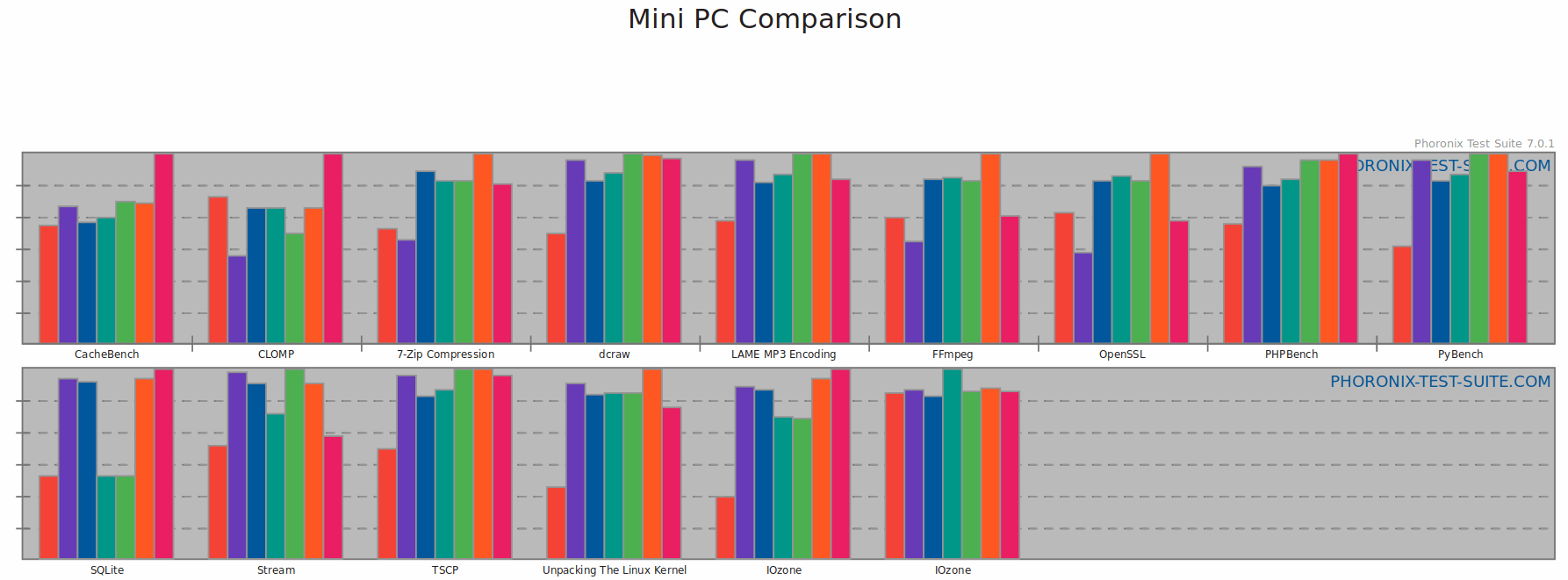
I’ve then ran ‘sbc-bench’ which is a small set of different CPU performance tests focusing on server performance, ‘glmark2’ from the standard repositories which is a benchmark for OpenGL (ES) 2.0. and only uses the subset of the OpenGL 2.0 API that is compatible, some real-world timing tests for the compilation, zipping and unzipping of the Linux mainline v5.2 kernel, ‘iozone’ also from the standard repositories which is a filesystem benchmark tool and finally ‘Octane 2’ which is a JavaScript benchmark and was run in Chrome.
A summary of the results from each of the above benchmark tests was compared with previously tested mini PCs as follows:
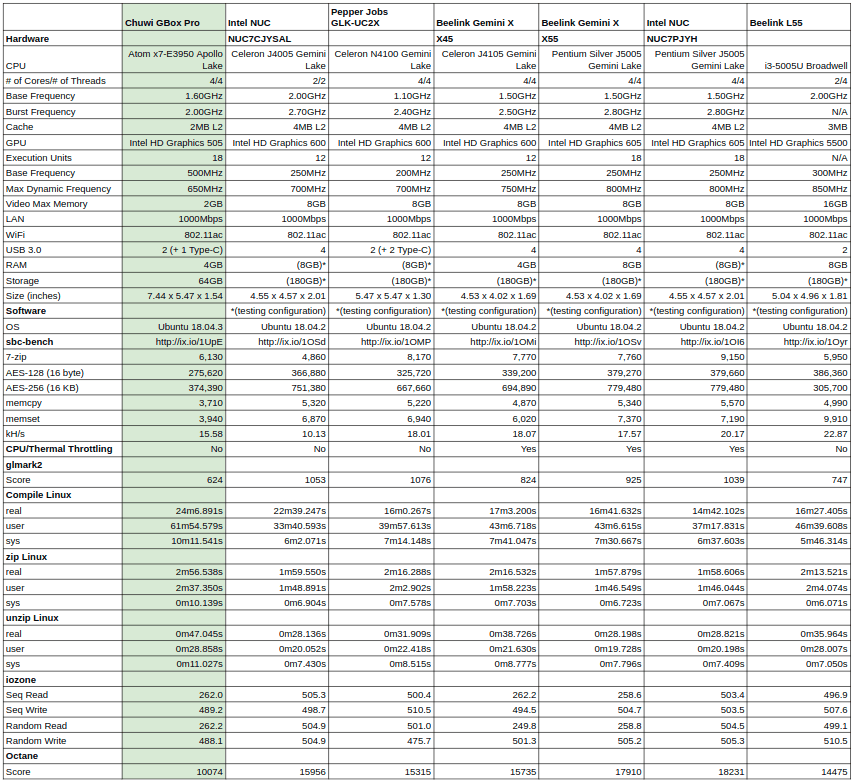
Interestingly the I/O read speeds for the GBox Pro were similar to the Beelink X45 and X55 devices and were nearly half that of the other devices.
For the sake of completeness, I also ran the same Linux benchmarks on Ubuntu running from the eMMC. As expected some of the results were lower for those that were impacted by the slower storage. For example, the ‘real’ time taken to compile the kernel went from 24m6.891s up to 27m18.329s and zipping it went from 2m56.538s up to 3m22.797s. For anyone interested, the ‘sbc-bench’ results for eMMC can be found at http://ix.io/1UdJ.
Network connectivity throughput was measured on Ubuntu using ‘iperf’:
Power consumption was measured as follows and is lower than comparable Gemini Lake devices:
- Powered off – 0.4 Watt
- Shutdown – 0.4 Watt (Windows)
- BIOS* – 4.3 Watts
- Boot menu – 4.2 Watts
- Idle – 3.4 Watts (Windows) and 2.4 Watts (Ubuntu)
- CPU stressed – 8.0 Watts (Ubuntu)
- Video playback** – 5.8 Watts (4K in Windows) and 6.9 Watts (1440p in Ubuntu)
* BIOS (see below)
** The power figures fluctuate so the value is the average of the median high and median low power readings.
Finally, the BIOS is fully unlocked and a brief overview is available in the following video:
Overall the device performs well in Windows playing 4K video however, in general, it is rather sluggish compared to more recent mini PCs.
I’d like to thank Chuwi for providing the GBox Pro for review. It currently retails at around $190 for the tested configuration.

Ian is interested in mini PCs and helps with reviews of mini PCs running Windows, Ubuntu and other Linux operating systems. You can follow him on Facebook or Twitter.
Support CNX Software! Donate via cryptocurrencies, become a Patron on Patreon, or purchase goods on Amazon or Aliexpress


